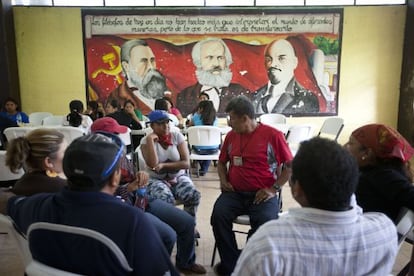Students challenge Mexican authority
Radical sympathizers of missing Iguala youths threaten to take over towns in Guerrero


Mexico’s radical left is challenging state and federal authorities over the disappearance of 43 college students who were turned over to a drug gang following their arrest in Iguala, in the state of Guerrero.
Around 50 student groups, unions and civil associations, including classmates of the missing youths at a teacher’s college in Ayotzinapa, announced the imminent takeover of Guerrero’s 81 local councils, new attacks on official buildings (the state headquarters was set on fire on Monday), roadblocks and marches throughout the territory.
The goal of this growing confrontation is the return of the missing students, whom friends believe to be still alive even though investigators suspect their bodies may be in some of the mass graves that have turned up outside Iguala since their disappearance on September 26.
“They took them away alive, we want them back alive!” chanted organizers of the self-proclaimed popular assembly held at the teacher’s college Escuela Normal Rural, in Ayotzinapa, a village near Iguala.
Some of the “actions” approved at this assembly include an ultimatum to the government; failure to comply will lead to an assault on all legislative, executive and judicial buildings in Guerrero, the assembly members warned.
The problem, however, long ceased to be confined to a state that has grown increasingly lawless and at the mercy of the drug cartels. The case of the missing students has become a fully fledged challenge to President Enrique Peña Nieto and his program of deep reforms to modernize the country and attract foreign investment.
The consequences of the social reaction to this latest act of barbaric violence in Mexico are unpredictable, especially since the shadow of the students’ likely assassination looms over the whole scenario.
Guerreros Unidos’ alleged financial chief arrested
The Attorney General’s Criminal Investigation Agency on Wednesday announced the arrest of the alleged head of financial operations for the drug gang Guerreros Unidos.
This criminal organization is being held responsible for the disappearance of 43 college students and the death of six others on September 26, when local police officers in Iguala arrested the youths and turned them over to the cartel.
According to Tomás Zerón de Lucio, head of the Criminal Investigation Agency, the detainee, named Raúl Núñez Salgado, allegedly paid 600,000 pesos a month (over €34,000) in bribe money to the deputy director of public security in Iguala, Francisco Salgado Valladares, who fled town shortly after the disappearance and remains at large.
Núñez Salgado was arrested at a shopping center in Acapulco, Mexican police authorities said. So far 46 people, most of them police officers, have been arrested in connection with the case.
“We are protesting to show our despair, we cannot remain silent. But if they are dead, then we will take other measures,” admitted a spokesman for a branch of the National Union of Education Workers.
The government is fully aware that a direct confrontation with the students would be rejected by a majority of Mexicans, who are aghast at the news of new mass graves whose contents do not match the students’ DNA, and angry at the fact that the intellectual perpetrators of the crimes are still at large while the youths’ whereabouts remain a mystery.
Yet even if the mystery gets solved, analysts such as Roy Campos feel that it will not put an end to the crisis. The fundamental problem is citizens’ lack of trust in their own law enforcement agencies, a feeling that was confirmed in Iguala, where local police officers were working at the service of the drug gang Guerreros Unidos.
This general disillusionment fuels radical leftist organizations and their calls for a change to the system. During the 10-hour-long popular assembly held in Ayotzinapa, long-winded speakers made recurring references to class struggle, direct democracy and peasant governments. A few even demanded the capture of deputies for trial by an indigenous justice system.
Another key element in the protest is the widespread rejection of the state governor, Ángel Aguirre, who is being blamed for the breakdown of Guerrero in recent years. His refusal to budge despite calls for resignation within and without his party only adds to the radical leftist’s ire.
Tu suscripción se está usando en otro dispositivo
¿Quieres añadir otro usuario a tu suscripción?
Si continúas leyendo en este dispositivo, no se podrá leer en el otro.
FlechaTu suscripción se está usando en otro dispositivo y solo puedes acceder a EL PAÍS desde un dispositivo a la vez.
Si quieres compartir tu cuenta, cambia tu suscripción a la modalidad Premium, así podrás añadir otro usuario. Cada uno accederá con su propia cuenta de email, lo que os permitirá personalizar vuestra experiencia en EL PAÍS.
En el caso de no saber quién está usando tu cuenta, te recomendamos cambiar tu contraseña aquí.
Si decides continuar compartiendo tu cuenta, este mensaje se mostrará en tu dispositivo y en el de la otra persona que está usando tu cuenta de forma indefinida, afectando a tu experiencia de lectura. Puedes consultar aquí los términos y condiciones de la suscripción digital.








































